|
January 15, 2020
The
Workers' Movement in 2020
It Is Up
to Us!

Opposition to Anti-Social
Offensive in Ontario
• Challenges
Facing the Movement for the Right to Education in Ontario
• All Out to Support
Education Workers' Ongoing Strike and Work-to-Rule Actions!
• Aims of Ford
Government's e-Learning Initiatives Exposed
• Legal Challenges to
Anti-Worker Legislation
Quebec
Government Steps Up Anti-Social Offensive
• All Out to Support the
Fight of Public Sector Workers for Their Rights and for Public Services
the People Need
• Nurses Speak Out and
Take Action Against Untenable Conditions
• Interview, Nathalie
Savard, President, Union of Nurses, Licensed Practical Nurses and
Respiratory Therapists of Northeastern Quebec
The Workers' Movement in 2020
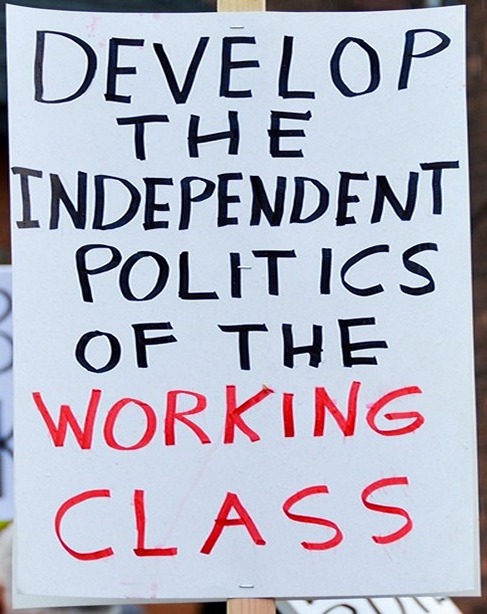  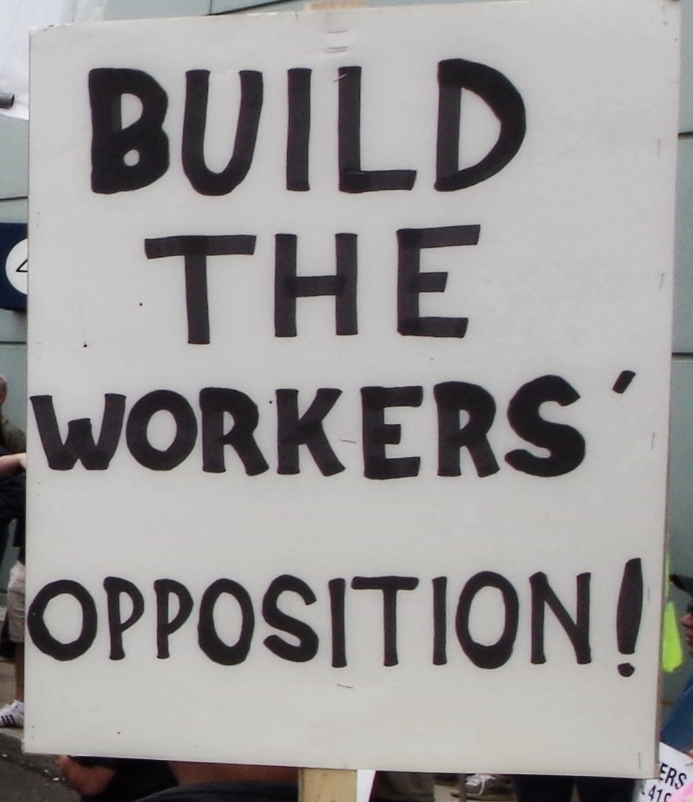
Unite to build the
defence organizations and independent voice
of the working class!
With this issue Workers' Forum
begins publishing in 2020. The year promises to be momentous for the
working class as many sections are in motion to defend what is theirs
by right. The realization that "It is up to us to defend our rights!"
has seized the imagination of many. Gone are the illusions that some
institutional force directed by the ruling elite and connected with
their state machine will defend workers' rights. "It is up to us!" to
build our defence and advocacy groups and voice of the present and for
a future fit for human beings. No one else will do it.
Our duty and social responsibility as workers
arise from the concrete conditions, human relations and problems as
they present themselves. No fudging of the conditions and relations we
face will do. No distortion of the tasks at hand is acceptable. The
working class is taking up its leading role in society by making
demands that provide society with a new pro-social aim and direction
for the economy, a force with the numbers, desire and resources to
defend its rights in the here and now.
 The ruling elite
of the financial oligarchy are a spent force at each other's throats
for power and constantly at war to build their global empires to seize
the social wealth workers produce. They see workers as a necessary
evil, a cost to their amassing of private wealth; they view workers as
things they can exploit, deprive of human rights and toss away as so
much scrap so the rich can live in luxury and privilege. The rich
oligarchs cannot solve any of the political, economic or social
problems confronting the people and country because they do not want to
do so. Real solutions would result in their loss of power and privilege
and the empowerment of working people. Real solutions demand the
recognition and defence of the rights of all and a new direction for
the economy to meet the needs and well-being of the people and to
humanize the social and natural environment. The ruling elite
of the financial oligarchy are a spent force at each other's throats
for power and constantly at war to build their global empires to seize
the social wealth workers produce. They see workers as a necessary
evil, a cost to their amassing of private wealth; they view workers as
things they can exploit, deprive of human rights and toss away as so
much scrap so the rich can live in luxury and privilege. The rich
oligarchs cannot solve any of the political, economic or social
problems confronting the people and country because they do not want to
do so. Real solutions would result in their loss of power and privilege
and the empowerment of working people. Real solutions demand the
recognition and defence of the rights of all and a new direction for
the economy to meet the needs and well-being of the people and to
humanize the social and natural environment.
The destruction and closure of production
facilities such as GM in Oshawa and throughout the forest industry,
Lowe's seizure of RONA and subsequent shutting of stores, the recurring
economic crises and endless aggressive wars, the use of scientific
technique such as software apps, automated vehicles, contract work and
human trafficking to force workers into precarious employment and
deprive them of their rights are all unacceptable and must cease.
Workers are the essential human factor in the economy and the producers
of all social wealth; they must set the aim of the economy to guarantee
their well-being and security. The economy is our economy and the
workers must have a voice, a say and control over its aim and direction.
Workers' Forum is more than the
voice of the working class to break the silence on the living and
working conditions of the working people; Workers' Forum
is an organizing tool, a forum around which workers and their allies
can inform others of their actions with analysis to defend their
rights, to meet and engage in discussions to sum up their activities,
to find their bearings, draw warranted conclusions and plan and
organize their coming activities.
It is up to us to build and disseminate Workers'
Forum, to write articles and reports of what the working
class is facing and doing, to gain subscriptions and financial
contributions and make Workers' Forum a powerful
organizing tool for the working class.
It is up to us to make 2020 a year of momentous
change towards empowerment of the working class!

Opposition to Anti-Social
Offensive in Ontario
 
Nearly 200,000 teachers and education workers
have entered a new phase of their resistance to the Ontario
government's program to restructure education so as to cut back on
investments in K-12 education and seek out ways to turn the delivery of
public education into a lucrative business. They are joined by hundreds
of thousands of students who want to improve the quality of their
education so that they can make a contribution to their society. They
are also joined by parents of students and the general society which
views the Ontario government's changes to K-12 education as arbitrary
and an attack on the youth and the most vulnerable in society.
 In this sense the
majority of Ontarians stand opposed to the direction the government is
taking which certain unions' own internal polling numbers reveal
clearly. The challenge is how to deal with a majority government which
represents a minority and is hell bent on imposing its dictate and
criminalizing those who refuse to sell out their conscience and their
responsibility to society and the younger generation as professionals. In this sense the
majority of Ontarians stand opposed to the direction the government is
taking which certain unions' own internal polling numbers reveal
clearly. The challenge is how to deal with a majority government which
represents a minority and is hell bent on imposing its dictate and
criminalizing those who refuse to sell out their conscience and their
responsibility to society and the younger generation as professionals.
The situation is different from the last major
conflict with the Ontario government in which the McGuinty Liberals
were in a minority situation and collaborated with the Progressive
Conservatives to try to get the neo-liberal program of the rich imposed
through legislation instead of reaching a negotiated settlement with
the teachers and other education workers. In this case the government
has a large majority and does not have to negotiate with other sections
of the ruling class in the form of the opposition to impose the dictate
of the rich. The government acts with impunity which is why working
people are finding ways to hold it to account. Court challenges are one
front of struggle but must not be used to demobilize the active fight
of education workers by leaving decisions to the courts on what is just
or unjust. Rulings that have affirmed rights are routinely violated by
governments which seek the same results by making adjustments. They
clearly do not prevent future governments from doing the same.
The official opposition in the Legislature
presents itself as the voice of the working people -- in this case
education workers -- but its aim is not the same as the aim of the
workers' movement which it seeks to divert into supporting its
electoral fortunes. They are worried that if they take a clear stand in
defence of workers' rights, especially if strikes ramp up and the
government imposes back-to-work legislation, they will lose the support
of the ruling class. In other words, they have shown they cannot be
relied upon to contribute seriously to this fight for the right to
education. Their self-serving electoral ambitions do not permit it.
This is a challenging situation in that it reveals
the failure of the democratic institutions to permit the will of the
majority to be expressed and become the law of the land. Instead
working people are told that all they need to do is vote for a more
labour-friendly party in the next election, while in the present
nothing can be done other than lobby those who have shown their concern
for justice is eclipsed by a concern with coming to power to deliver
justice.
 Life experience
has shown that rights are affirmed by transcending the limits placed on
the thinking and actions imposed on the workers' movement by the rulers
whose aim is to serve the rich. The parties which form the cartel party
system of government disempower the majority by dividing the ranks of
the working people between different factions of the rulers and on
every conceivable basis. Most importantly, they deprive the working
people of their own reference points based on the right to suitable
wages and working conditions. On the basis of their own concerns, not
those of the rich, the working people must wage the fight in the court
of public opinion. They must oppose the neo-liberal nonsense that
austerity is necessary, that they represent a cost rather than a source
of value for the society, and that pay-the-rich schemes lead to
prosperity. By building their steadfast resistance to the anti-social
offensive they not only affirm their rights but also work out how to
hold governments to account. Life experience
has shown that rights are affirmed by transcending the limits placed on
the thinking and actions imposed on the workers' movement by the rulers
whose aim is to serve the rich. The parties which form the cartel party
system of government disempower the majority by dividing the ranks of
the working people between different factions of the rulers and on
every conceivable basis. Most importantly, they deprive the working
people of their own reference points based on the right to suitable
wages and working conditions. On the basis of their own concerns, not
those of the rich, the working people must wage the fight in the court
of public opinion. They must oppose the neo-liberal nonsense that
austerity is necessary, that they represent a cost rather than a source
of value for the society, and that pay-the-rich schemes lead to
prosperity. By building their steadfast resistance to the anti-social
offensive they not only affirm their rights but also work out how to
hold governments to account.
Workers' Forum calls on
Ontarians to vigorously support the teachers and education workers and
demand the government reverse its cuts and withdraw its anti-worker
legislation. Do not permit the criminalization of those who fight for
rights!


Picket at Thorold Secondary School, January 8, 2020 on the year's first
one-day OSSTF strike.
As of January 13, all of the four unions
representing teachers and education workers in Ontario are at some
stage of strike actions to oppose the Ontario government's
restructuring of public education and the violation of their rights to
collective bargaining. While the government is fighting to erode
education and privatize its delivery, Ontario's educators are fighting
to defend their right to have a say over the direction of education so
that it serves the needs of the youth, rather than the demands of the
rich.
The Ontario Secondary School Teachers' Federation
(OSSTF) has been carrying out strike action, both work-to-rule and
rotating weekly one-day full withdrawal of services, since December 4,
2019, with all their members working in K-12 and adult education having
participated in, or set to participate in, at least two days of full
work withdrawals. OSSTF members have also been involved in informing
their communities what their fight is about through leafletting and
holding information pickets. Their work-to-rule actions thus
far have forced the government to postpone the standardized Ontario
Secondary School Literacy Test (OSSLT), which was to be held in
January. Their rotating strikes continue each week with five districts
going out January 15.
 The Elementary Teachers'
Federation (ETFO) has stepped up its strike actions since implementing
its first phase of work-to-rule. As of January 13 its members began
withdrawing from all extracurricular activities such as sports and
school clubs outside of school hours as well as other administrative
duties including those related to the implementation of standardized
testing (known as EQAO). Members arrive at school and leave according
to the requirements of their contract, rather than being at school for
the many hours before and after like they normally are to prepare for
their classes or lead voluntary activities for students. ETFO has also
announced that it will begin rotating strikes starting January 20,
unless there is progress in negotiations. The Elementary Teachers'
Federation (ETFO) has stepped up its strike actions since implementing
its first phase of work-to-rule. As of January 13 its members began
withdrawing from all extracurricular activities such as sports and
school clubs outside of school hours as well as other administrative
duties including those related to the implementation of standardized
testing (known as EQAO). Members arrive at school and leave according
to the requirements of their contract, rather than being at school for
the many hours before and after like they normally are to prepare for
their classes or lead voluntary activities for students. ETFO has also
announced that it will begin rotating strikes starting January 20,
unless there is progress in negotiations.
On January 13 the Ontario English Catholic
Teachers' Association (OECTA) launched its first phase of work-to-rule
actions. It has made clear that if the government does not back down on
its moves to deteriorate publicly funded education it will begin full
strikes, rotating or otherwise. OECTA has announced its members will
hold a province-wide strike Tuesday, January 21.
On January 11, the Association des enseignantes et
des enseignants franco-ontariens (AEFO) announced that its members have
given the union a 97 per cent strike mandate and will begin a selective
withdrawal of services starting January 16.
There are two other groups of unions that
represent education workers that are not on strike or carrying out
work-to-rule actions at this time. One, the Education Workers' Alliance
of Ontario (EWAO) represents, among others, education workers'
associations in Dufferin-Peel, Halton and Waterloo Region and the
Association of Professional Student Services Personnel. EWAO currently
has a tentative agreement with the government and its members are
holding ratification votes. The other group, the Ontario Council of
Educational Workers, made up of workers represented by the Canadian
Office and Professional Employees Union, Unifor, Ontario Public Service
Employees' Union and Service Employees International Union, among
others, is still in negotiations.
Overall, recent actions bring upwards of 190,000
Ontario teachers and education workers into job actions to reject the
direction that the Ford government wants to take Ontario's education
system.
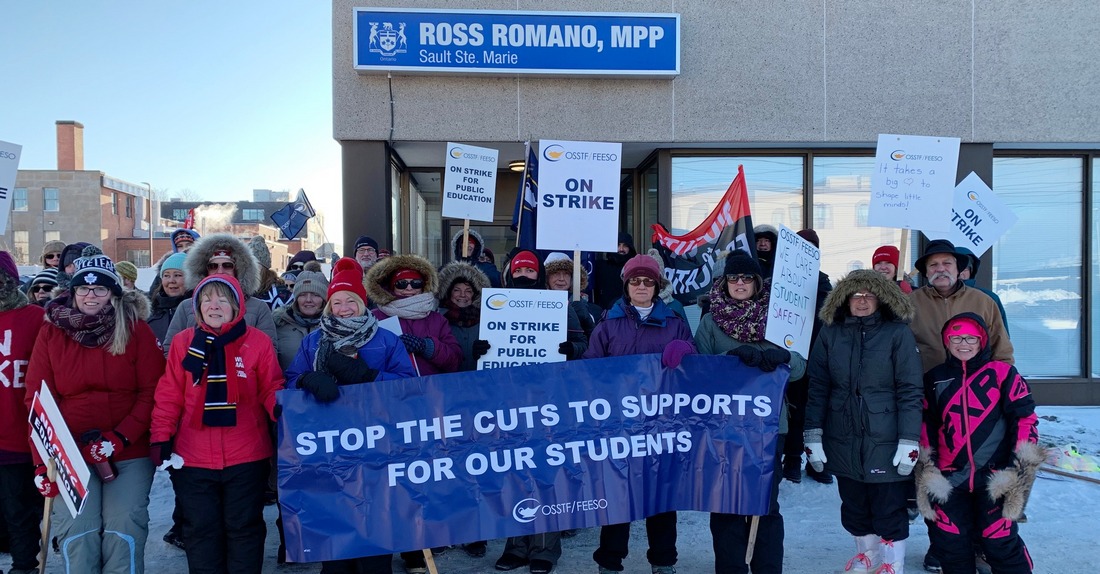
One-day OSSTF strike, Sault Ste Marie, January 8, 2020.

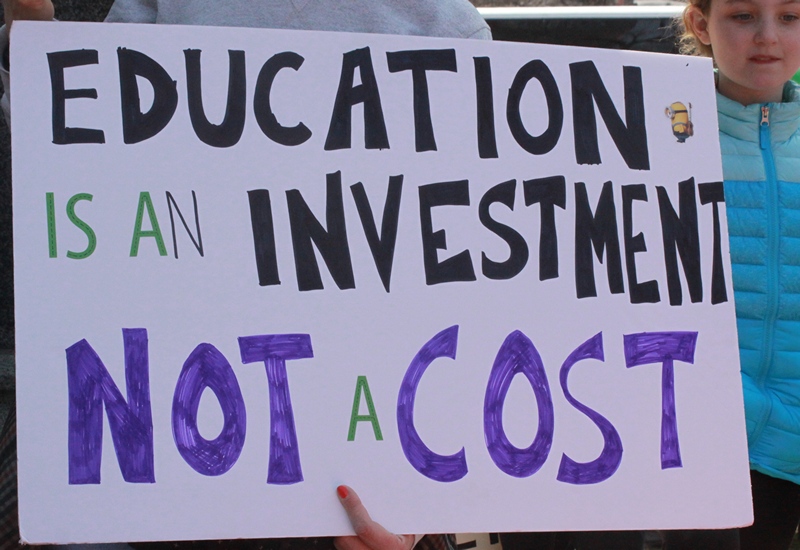 The Ontario
government has claimed that it wants to bring in e-learning courses,
which will be mandatory for students to graduate, as a way of preparing
them for the modern world and for post-secondary education. However, on
January 13, the Toronto Star reported that it had
obtained confidential documents that clearly reveal that the overall
plan of the Ontario government is to use e-learning to cut funding to
school boards and to sell e-learning courses to other jurisdictions and
to international students. This includes creating a new entity to
maintain and create a catalogue of "gold standard" online courses in
English and French so that "maximum revenue generation may be realized." The Ontario
government has claimed that it wants to bring in e-learning courses,
which will be mandatory for students to graduate, as a way of preparing
them for the modern world and for post-secondary education. However, on
January 13, the Toronto Star reported that it had
obtained confidential documents that clearly reveal that the overall
plan of the Ontario government is to use e-learning to cut funding to
school boards and to sell e-learning courses to other jurisdictions and
to international students. This includes creating a new entity to
maintain and create a catalogue of "gold standard" online courses in
English and French so that "maximum revenue generation may be realized."
The plan, directed by the Ministry of Education,
is "to develop [a] business model to make available and market
Ontario's online learning system to out-of-province and international
students and examine feasible options for selling licensing rights to
courses/content to other jurisdictions."
Under the heading "cost saving and revenue
generation," the document noted that "the system does not generate any
revenue for the province" and warned "costs for creation of online
learning tools and resources may be duplicated across multiple delivery
partners." This itself is pure disinformation. Educated youth generate
billions in revenue for the businesses they work for. This must not
only be recognized but new arrangements are needed to realize the
wealth created through education as public revenue.
The plan showed that the Ford government had
originally thought to make e-learning courses optional while at the
same time slashing funding to public boards, essentially forcing them
to gradually offer a minimum number of e-learning courses that would
increase over time.
The government did not dispute the authenticity of
the internal document, which is not dated but was written between March
16, 2019 and summer's end, according to time references in the text.
"We remain committed to building a world-leading
online learning system to strengthen Ontario students' competencies in
the modern economy," Education Minister Stephen Lecce's office said.
 "We are
proceeding with developing and implementing a made-in-Ontario program
that will ensure student flexibility, technological literacy and a vast
selection of courses, through two mandatory courses over the lifetime
of a student's high school career," the statement added. "We are
proceeding with developing and implementing a made-in-Ontario program
that will ensure student flexibility, technological literacy and a vast
selection of courses, through two mandatory courses over the lifetime
of a student's high school career," the statement added.
The confidential document stated the plan was for
the education ministry to "closely monitor uptake of online learning
over the first four years of implementation, assess the feasibility of
making online learning mandatory for credit accumulation" toward an
Ontario secondary school diploma.
"School boards will be required to meet
progressively increasing minimum targets for student enrollment in
online learning courses; optional enrollment at the individual student
level," the plan stated.
The plan calls for $34.8 million less in funding
to school boards in the school year starting September 2020, $55.8
million less in 2021, $56.7 million less in 2022 and $57.4 million less
in the 2023-2024 school year.
After that, there would be "continued cost saving
of $57.4 million annually with full catalogue of online 'gold standard'
courses," the plan predicted.

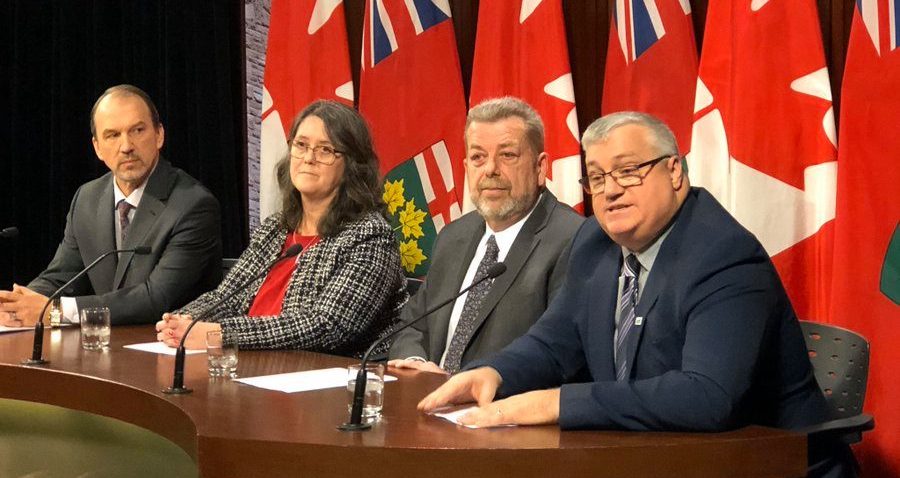
Education unions initiate legal challenge to Protecting a
Sustainable Public Sector for Future Generations Act, December
12, 2019.
Unions in Ontario have launched a number of court
challenges to the Ontario government's Protecting a
Sustainable Public Sector for Future Generations Act that was
passed on November 7, 2019. The legislation violates the right of
nearly all public sector workers to negotiate their wages by imposing a
one per cent wage cap on new compensation as well as new provisions for
the government to violate privacy and operate with impunity.[1] Workers affected
by the Act, also known as Bill 124, include those employed by the
provincial government, Crown agencies, school boards, universities and
colleges, hospitals, non-profit long-term care homes, Children's Aid
societies, social service agencies and the electricity and energy
sectors.
On December 12, 2019, all four teacher and
education worker federations were the first to launch challenges. These
were: the Association des enseignantes et des enseignants
franco-ontariens (AEFO), the Elementary Teachers' Federation of Ontario
(ETFO), the Ontario English Catholic Teachers' Association (OECTA) and
the Ontario Secondary School Teachers' Federation (OSSTF).
Given the content and timing of the legislation,
in the midst of negotiations for the renewal of collective agreements
in the education sector, the unions contend that Bill 124 is a direct
attack on free collective bargaining in the education sector, and a
violation of sections 2(b) and 2(d) of the Canadian
Charter of Rights and Freedoms, which
guarantee freedom of expression and the freedom of association. In
addition, the legislation violates the duty of the Crown to bargain in
good faith.
On December 17, 2019, the Ontario Nurses'
Association (ONA) announced it was launching its own challenge to the
legislation and later that day ten more unions joined, representing
more than 250,000 Ontario workers. The ten were: the Canadian Union of
Public Employees (CUPE); Service Employees International Union (SEIU)
Healthcare; United Steelworkers (USW); Public Service Alliance of
Canada (PSAC); the Society of United Professionals (IFPTE) Local 160;
Canadian Office and Professional Employees Union (COPE Ontario);
Association of Management, Administrative and Professional Crown
Employees of Ontario (AMAPCEO); the International Brotherhood of
Electrical Workers (IBEW); the Professional Institute of the Public
Service of Canada (PIPSC), and United Food and Commercial Workers
(UFCW) Local 175. Additional unions and organizations representing
public sector workers in Ontario are expected to join this coordinated
challenge or pursue their own separate legal challenges to Bill 124 in
the coming weeks.
Who Said What
Ontario Federation of Labour (OFL):
"The workers of this province, represented by their unions, will not
allow Bill 124, which erodes the Charter rights of every worker in
Ontario, to stand uncontested," said OFL President Patty Coates. "The
OFL stands in solidarity with the education unions that have recently
launched their challenges to the application of Bill 124 in the
education sector, as we escalate the opposition to this government's
continued attack on the Charter rights of all Ontarians. Together, we
are launching an aggressive campaign to demand the Ford Conservatives
repeal this unconstitutional legislation."
Ontario Nurses' Association (ONA):
"As the union representing registered nurses and health-care
professionals in Ontario, ONA believes Bill 124 discriminates against
nurses and all Ontarians," said ONA President Vicki McKenna, RN. "This
legislation is nothing but a continued attack on the right to free
collective bargaining without interference, as was affirmed in 2015 in
a Supreme Court of Canada ruling. More alarming is the fact that this
legislation could likely deepen the already serious nursing shortage in
Ontario, and have negative effects on health care and public safety."
"This legislation is an attack on nurses and an
attack on women," said McKenna. "By forcing front-line nurses and
health-care professionals to accept compensation increases that fall
below the rate of inflation, this bill will only worsen what is already
a serious nursing shortage in Ontario and worsen hallway health care."
SEIU Healthcare: "For workers
in equity-seeking groups - racialized workers, workers with a
disability, Indigenous, and women workers, collective agreements are
essential to ensuring fairness in the workplace," said Sharleen
Stewart, President of SEIU Healthcare. "For the government to set
limits on bargaining undermines the rights of workers who already face
systemic discrimination across the board."
United Steelworkers (USW) District 6:
"Families in our province have relied on negotiations for decades to
secure their working conditions. This has resulted in the establishment
of the middle class. Middle class families are the backbone of our
province and country, and it is fundamentally wrong to strip them of
their collective bargaining rights," said Marty Warren, Director of USW
District 6. "The USW and its engaged membership are aggressively
pushing back on this one-sided legislation. Justice must be upheld for
Ontario's working families."
AEFO: "The Charter exists to
protect the rights of Canadians, even when those rights are not
convenient for governments," said AEFO President Rémi
Sabourin. "That is the backbone of our democracy."
ETFO: "Bill 124 violates the
democratic rights of all workers in Ontario's public sector," said ETFO
President Sam Hammond. "No employer should be permitted to undermine
employees' fundamental rights without facing the strongest possible
challenge. The Ford government should recognize these rights and repeal
Bill 124 immediately."
OECTA: "Given the timing of
Bill 124, and the haste to get it passed into law, it is clear that it
targets teachers and education workers," said OECTA President Liz
Stuart. "This legislation effectively ties the hands of both the
employer and employee representatives who are currently negotiating
collective agreements. This is unacceptable, and in our view, it is
unconstitutional."
OSSTF: "Governments should not
lightly infringe on the civil rights of their citizens," said OSSTF
President Harvey Bischof. "They should rely on tried and tested
bargaining processes that lead both parties to creativity in the
process, and stability thereafter. There is no current economic or
fiscal crisis that requires such an extraordinary interference in that
process."
CUPE: "This challenge is about
defending workers' rights protected under the Charter of Rights and
Freedoms," stated CUPE Ontario President Fred Hahn. "When the Ford
Conservatives demand that we must all do our part, instead of targeting
working people the government should be taxing profitable corporations
and the wealthiest in our communities. Charter Rights matter, Human
Rights matter, Workers' Rights matter."
Note
1. For
full information on the legislation see TML
Weekly, August 31, 2019 and TML Weekly November
23, 2019.

Quebec Government Steps Up
Anti-Social Offensive

Unions representing the 500,000 Quebec public
sector workers attempting to renew their collective agreements in a way
that favours them and public services report that the Quebec government
and management bargaining committees have tabled their sectoral offers,
which concern working conditions. The central offer, which deals with
monetary issues such as wages and pensions, was filed at the end of
2019 and is considered a provocation by the workers. The wage "offer"
would see wages increase by even less than the cost of living over five
years. The unions have now also filed their sectoral demands.
The unions report definite common features of the
sectoral offers of the Quebec government and its bargaining agents.
According to the unions, they consist mainly of nice-sounding phrases
about the importance of social programs and public services and
proclamations of respect for public sector workers. They are without
concrete proposals, especially in response to the demands put forward
by the workers and their unions for drastic improvements in working
conditions and services.
Several unions also report that when the health,
education and public services authorities' bargaining committees met
their union counterparts to table their offers, they asked that the
unions and the workers stop speaking out publicly against the bad
conditions in the sector. They equated the workers' speaking out with
badmouthing the public sector. This, according to the employers'
representatives, is why workers leave the sector and why so few are
joining it.
Although the offers do not contain concrete
proposals, according to the unions the offers suggest that the
government wants to increase what it calls "flexibility and mobility"
of the workforce, especially in relation to absenteeism for health
reasons, moving workers around, even forcing workers to work while sick
or face disciplinary action, reducing sick leave, and so on. These
measures are already part of workers' daily lives but it seems that the
government is seeking to enshrine these attacks in collective
agreements.
Workers report that it is clear that the
government does not acknowledge nor does it care that public services
are at a breaking point and that workers are experiencing a crisis at
the workplace which is spilling into their lives outside of work and
which deeply affects the public services.
There is a world of difference between the
pay-the-rich schemes that are immediately put in place by various
governments -- including the provision of massive amounts of public
funds -- when private monopolies say they are in crisis, and the
government’s attitude towards the crisis in public services.
Public money is poured into the monopolies without investigation
because neo-liberal governments consider private monopolies as the
creators of society's wealth and that everything should be subordinated
to their demands. They do not recognize that it is the workers who
create society's wealth.
Public sector workers are considered a cost to be
reduced, which puts workers and those who receive public services at
great risk. Neo-liberal governments consider public services and public
sector workers an encumbrance to be eliminated through privatization.
This is unacceptable and must not pass.
It is no surprise then that workers are facing
more diversions, new tactics that the government is inventing to avoid
negotiating with them on the basis of their demands and the needs of
the services. One of these is a proposal by the government for
so-called discussion forums, outside of negotiations, to which not even
all the unions will be invited. The government has identified three
topics for the discussion forums: educational success; access to care
for people in long-term health care facilities or receiving home care;
and the overall health of public sector workers. It has indicated that
additional money for the workers may be available through the forums
and that the discussion will be centered on the working conditions of
the most vulnerable workers. What is going to be the process of
discussion and decision making? How will whatever comes out of these
forums be legally binding?
So far, the Quebec Federation of Labour (FTQ), the
Quebec Interprofessional Health Federation (FIQ), and the Alliance of
the professional and technical health and social services staff (APTS)
have announced that they will not participate in these forums and are
demanding that these issues be dealt with through negotiations and on
the basis of workers' demands. The Centrale des syndicats du
Québec (CSQ) indicated that it considers the forums a way of
taking attention away from the real problems that are facing public
sectors workers and public services as a whole.
This issue of Workers' Forum
will begin to inform the readers about the demands of the public sector
workers.
Clearly, there is a need for public opinion to be
mobilized to fully support the public sector workers and to demand that
the government stop its dirty manipulations to negate the rights of
these workers and the critical need for drastic change to defend and
improve social programs and public services according to the needs of
modern Quebec.


Healthcare workers begin negotiaitons with Quebec government, October
24, 2019.
Putting into practice their motto "We're done
working ourselves sick!," nurses who are members of the Quebec
Interprofessional Health Federation (FIQ) spoke out and took action at
the beginning of January against untenable conditions in emergency
rooms in Quebec. On January 5, FIQ nurses in Montreal held sit-ins on
two different shifts at the Maisonneuve-Rosemont Hospital and a sit-in
at Santa Cabrini Hospital to highlight the crisis that exists in
emergency rooms for workers and patients. This happened after nurses
had been repeatedly forced to work mandatory overtime, sometimes triple
shifts, to deal with the crisis in the emergency rooms. At the
beginning of January, occupancy rate at the emergency rooms was 139 per
cent at Santa Cabrini, 160 per cent in the whole
Montérégie region, and 129 per cent in Montreal.
At Maisonneuve-Rosemont, the emergency room has been in non-stop crisis
for over a year.
While the nurses were holding their sit-ins, FIQ
representatives went to the media to expose the situation and demand
immediate solutions that are favourable to the nurses and the patients,
for which they have been advocating for years. They made the point that
the crisis in Quebec's emergency rooms is not a matter of a sudden
seasonal increase in patients coming in with flu (although this problem
also exists), as nurses have been pointing out for a long time. The
problem, they said, is a systemic overall deterioration in the health
care sector, in which formerly exceptional measures such as mandatory
overtime have become the norm and referred to now as a "management
tool." Such measures are being taken instead of dealing with the
problems in the health care sector. For example, FIQ representatives
pointed out that various hospital administrations have started to call
in nurses who are on leave for various reasons, and retired nurses, in
an effort to deal with the crisis in the emergency rooms and elsewhere,
and have made this into another "management tool." They point out that
even when more full-time nursing positions are created, which is one of
their demands, this is not a solution on its own because only a small
percentage of nurses are going to take these jobs because they fear
that if they take regular full-time employment they will just face more
pressure to stay at work for mandatory overtime. Addressing the
problems would include giving a key role to the nurses and other health
care workers to determine what is needed to establish appropriate
conditions for workers and patients in emergency rooms.
In terms of measures to alleviate the crisis,
nurses are pointing out that wherever their demand for an adequate
nurse-to-patient ratio has been tried as a pilot-project, immediate
improvement was noticed for both nurses and patients. The government
is, to say the least, dragging its feet on the implementation of these
much needed ratios.
The nurses are holding their actions in
conjunction with trade unions such as FIQ tabling their sectoral
demands to the government and management negotiating committees on
health care. The FIQ document is itself entitled "We're done working
ourselves sick!"
The document delineates two negotiation priorities:
- health and safety at all levels of the system:
an essential requirement for health care professionals;
- attraction-retention: obtain winning conditions for health care
professionals.
According to the document, FIQ's negotiation
objectives are:
- organizing the work to ensure health care
professionals' and patients' health and safety;
- enhancing health care professionals' practice and expertise;
- accessing quality positions;
- restoring work-personal life balance to preserve health care
professionals' psychological health; and
- equipping the teams to respond better to health care professionals'
needs.
Among the concrete measures proposed are a
reasonable and safe workload, safe health care professional-to-patient
ratios, stabilizing the work teams, and eliminating the use of
mandatory overtime as a management method. They also include demands
related to days off, scheduling and organization of work time over
which nurses must have a say. In the unhealthy context in which more
and more nurses are getting sick, both physically and psychologically,
the FIQ wants to obtain a commitment that health care professionals'
rights will be properly respected by facilitating access to salary
insurance benefits, real support for rehabilitation and their return to
work. FIQ also wants a review of the administrative and legal
procedures so that the handling of contentious cases (contesting
employers' decisions by grievances or other procedures) is simplified
and sped up.
To access the FIQ document, click
here.

Workers' Forum:
Where is SIISNEQ at in the process of renewing its
members' collective agreements?
Nathalie Savard:
SIISNEQ represents 1,200 nurses, licensed practical nurses and
respiratory therapists on Quebec's North Shore and in Northern Quebec.
Our members' collective agreements expire on March 31. For us, the
upcoming negotiations bring to mind the importance of finding solutions
so as improve health care.
Through the Quebec Health Federation, of which we
are a part, we have submitted our offers to the employers. At the
sectoral level, that is to say at the level of working conditions, it
is clear that compulsory overtime and the use of private employment
agencies to provide workers in the sector must be ended, and that the
employer must respect the terms of employment of our members. When you
are a nurse, licensed practical nurse or respiratory therapist, you
have a 35, 36 or 37.5 hours per week position. We expect to provide
this service and provide it in a safe and healthy work environment
without being constantly burdened with additional tasks. However, we
often see our members not taking their breaks, shortening their meal
breaks, and a lot of pressure is put on them to work overtime at the
end of their shift. It is important that the negotiations contribute to
resolving these difficulties, so that people are able to do their work
well. Working conditions must be those that respect their work because
they care for human beings who are suffering, and often their families
as well. We must regain this human dimension that we have lost over the
years, through all the budget cuts, all the job cuts in the health care
sector.
We have solutions to propose to the employers,
creating full-time positions, taking the money that is spent on private
employment agencies and reinvesting it in the health network, measures
necessary to retain our young people, 10 per cent of whom leave the
profession in their first five years at work, supporting them by
creating mentoring positions. There are great things that can be done
but there must be a will to do them. We are facing a government that
made us a really ridiculous offer before Christmas in terms of wages,
seven per cent over five years, when what is necessary is to improve
the public profile of public services.
WF: What has
emerged from the employer sectoral offers that have been presented to
you?
NS: When the
government tabled its sectoral proposals to our federation,
representatives of the management committee told us that unions speak
badly of the profession, and that this makes it difficult to attract
people to the profession. It is not a serious argument. Young people
are quite capable of forming their own opinions when they come to do
internships in the health institutions.
We feel that this is a government that wants to
come in and take an axe to certain working conditions, such as sick
leave and statutory holidays. The employer is saying that it cannot
provide sick leave because there are not enough people working, so they
are looking to reduce sick leave. They seem to want to attack our
vacation time too.
We have very opposite positions. We have to find a
way to attract young people to the profession. Young people are very
interested in their quality of life. We cannot ask people to submit to
conditions of modern-day slavery, it will not work. This is not how we
will reduce sickness and absenteeism in the network.
The employer speaks to us about mobility and
flexibility while we are looking for team stability. The treatments are
complex and people develop specialties. They have to develop good
quality skills and good follow-up with patients.
It is even more difficult to recruit people in
remote areas. We are finding it increasingly difficult to recruit on
the North Shore and in Northern Quebec. We have our specialties in our
regions, in oncology, hematology, our mother-child centres, etc. and it
is increasingly difficult to maintain these services due to a lack of
nurses, licensed practical nurses and respiratory therapists. If we are
not able to promote the profession, will we still be able to provide
the services? Is the government heading towards shifting services to
the private sector? This is the real question. We made a choice as a
society to create a public health service accessible to all. The
situation we are in must change now.
WF: Do you
want to say something in conclusion?
NS: The
Coalition Avenir Québec government has promised not to act
the same as the Liberals did in terms of health care. They say that the
reign of Barrette is over. [Gaetan Barrette was the Health
Minister under the previous Liberal government who stepped up the
anti-social restructuring of health care in Quebec -- WF].
And yet the negotiations began with the same tone. We are not against
devoting funds to improving the conditions of care givers, but in the
health sector we must take care of everyone. We have to take care of
everything, not just one job category, we have to solve the problem of
the network as a whole, in order to be able to provide services.
Solutions have to be found and negotiations have
to take place, or else it will be a mobilization that takes place. For
us this is a priority in 2020. We must mobilize our troops and make
Premier Legault and the Minister of Health understand that we are here
to keep a quality public network and that for us health care in the
remote regions is very important. It is a priority to provide quality
services to the people who live in these regions, in this large
territory, so that they do not need to go to Quebec City and Montreal
for treatment.
I hope that the year 2020 will a good one for our
members, that we settle things. I salute them, they have their
profession at heart and I wish them the best. The negotiations must
ensure that the negotiating parties can come to an agreement and
resolve the difficulties that these people have been experiencing for
too long.

(To access articles
individually click on the black headline.)
PDF
PREVIOUS ISSUES | HOME
Website:
www.cpcml.ca Email: office@cpcml.ca
|

